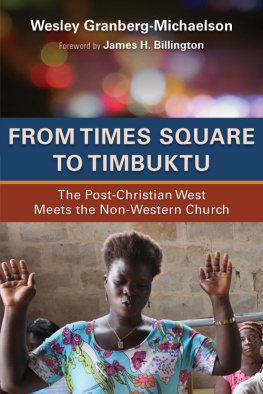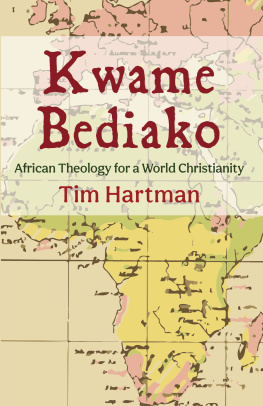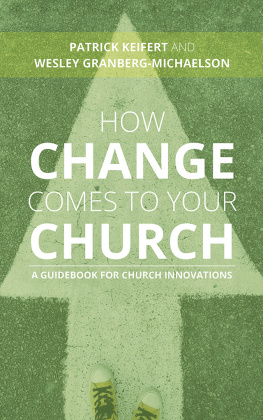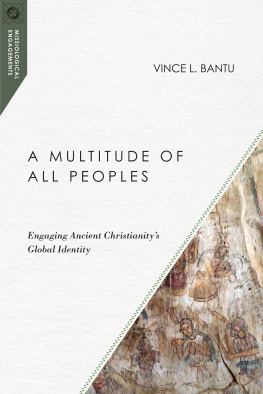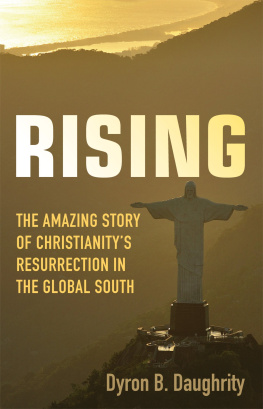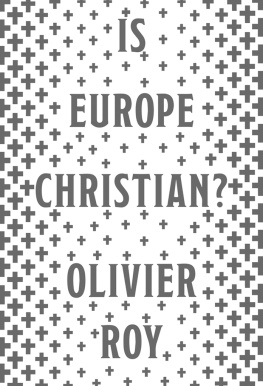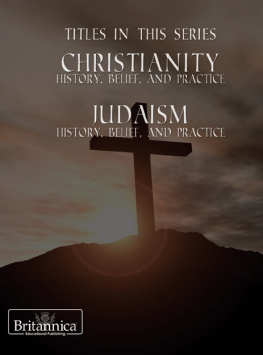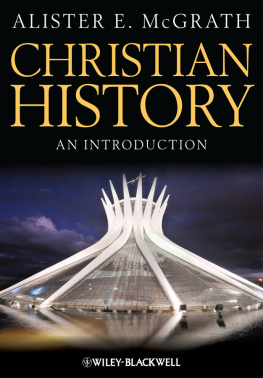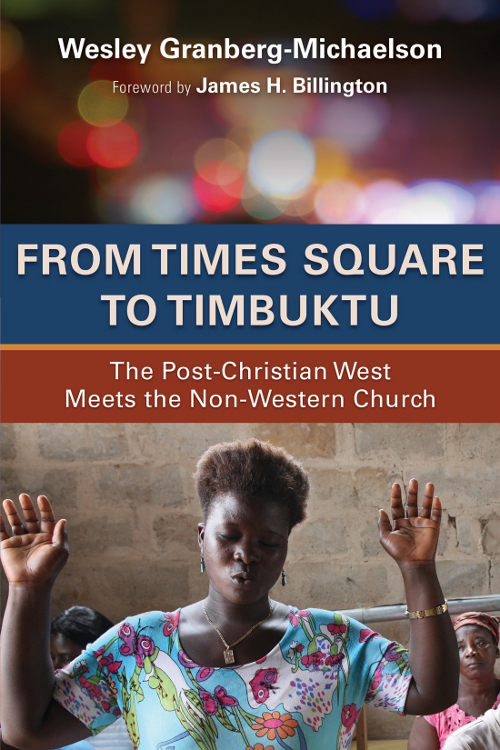
In our day the Christian faith is (not for the first time but for the first time in many centuries) truly ecumenical; that is, it reflects the whole inhabited world in its cultural and linguistic diversity. One of the many merits of this fine book is that it demonstrates that the crucial issues for contemporary Christians arise directly from this fact; and that, for Western Christians in particular, they involve renewal of vision and shifting of focus, a conversion of habits of mind and association. There are now many surveys of world Christianity, but few of them grapple, as this one does, with the immediate and practical implications of the transformation of the Christian church.
ANDREW F. WALLS
Liverpool Hope University
Akrofi-Christaller Institute of Theology, Mission and Culture
A timely and discerning interpretation of current developments in world Christianity.... Knowing that a process is under way and coming to terms with it are two different things. Granberg-Michaelson presents not just what God may be doing with the Christianity of the global South and East but also how he expects interest groups like the WCC to respond. This will definitely be mandatory reading for my students of non-Western Christianity.
J. KWABENA ASAMOAH-GYADU
Trinity Theological Seminary,
Accra, Ghana
Over the past decade, we have seen many books that announce the rise of Christianity from the global South and East, but this new book by Wes Granberg-Michaelson is different. Yes, world Christianity is here, he says but now what?... Offering wise and winsome advice for intercultural fellowship and partnership, this book is both eye-opening and deeply practical. I hope it provokes fresh Christian thinking and engagement, far and wide.
JOEL CARPENTER
Nagel Institute for the Study of World Christianity,
Calvin College
Granberg-Michaelson describes with great skill how the demographic shift of Christianity to the global South over the past hundred years has transformed the faith. In the process, he asks penetrating questions about its seemingly intractable divisions and unrelenting fragmentation. His proposal for unity in the midst of this chaos comes from a deeply personal and compelling vision for Christians to share their common pilgrimage. Only then, he notes, will the global church be truly effective in offering hope and reconciliation to our divided world.
TODD M. JOHNSON
Gordon-Conwell
Theological Seminary
From Times Square to Timbuktu
The Post-Christian West Meets the Non-Western Church
Wesley Granberg-Michaelson
William B. Eerdmans Publishing Company
Grand Rapids, Michigan / Cambridge, U.K.
2013 Wesley Granberg-Michaelson
All rights reserved
Published 2013 by
Wm. B. Eerdmans Publishing Co.
2140 Oak Industrial Drive N.E., Grand Rapids, Michigan 49505 /
P.O. Box 163, Cambridge CB3 9PU U.K.
Library of Congress Cataloging-in-Publication Data
Granberg-Michaelson, Wesley.
From Times Square to Timbuktu: the post-Christian West meets the non-western church / Wesley Granberg-Michaelson.
pages cm
Includes .
ISBN 978-0-8028-6968-5 (pbk.: alk. paper); 978-1-4674-3895-7 (ePub); 978-1-4674-3854-4 (Kindle)
1. Christianity 21st century. I. Title.
BR121.3.G73 2013
270.8 3 dc23
2013011137
www.eerdmans.com
To Hubert van Beek
A faithful colleague and
persistent ecumenical pioneer
Contents
The modern Western study of demography and development in the non-Western world generally neglects the subject of religion. Our mainstream opinion makers often seem to suggest that religion itself is both sustaining backwardness and promoting violent extremism in what we used to call the Third World.
This succinct and readable book by Wesley Granberg-Michaelson tells us a very different story. It is a reality check about how, within the worlds largest religion, the post-Christian West is meeting the non-Western church. Granberg-Michaelson provides both
1. a brief history of how the worshiping center of global Christianity has moved from the Northern Hemisphere to the Southern Hemisphere; and
2. a plea for American churches to develop new, multicultural communities of faith with the many diverse Christians now migrating from the South to the North.
Granberg-Michaelson writes from a rich background of Christian experience as the former head of the Reformed Church in America, as a key staff leader for the World Council of Churches in Geneva, and as a charter participant in a new international and non-hierarchical ecumenical movement. But he is writing here as a descriptive analyst reflecting on existing statistics not as a proselytizing theologian or philosophical critic of contemporary culture.
Granberg-Michaelson sees post-Western Christianity as creating a variety of emotionally expressive local communities rather than new denominations. The new southern center of Christianity is also redrawing the boundaries that in the West have separated out the material from the spiritual world. He tends to relate all this to the broader phenomenon in the Southern Hemisphere of moving beyond all its past dependencies not just away from distant colonial overlords, but also beyond more recent home-grown dictators who cloak themselves with demagogic, secular nationalism.
Granberg-Michaelson advocates for America a genuine pluralism, not defined by elites who take for granted a secularized view of the world, but created to include the wide range of religious voices and worldviews that are now making America their home. This is arguably not too far from the basic view of almost all of our founders that pluralism meant a plurality of authentic convictions in and about religion, not a monism of indifference verging on hostility to religion itself.
JAMES H. BILLINGTON
Librarian of Congress
While anecdotes and personal observations prompted my curiosity about the themes of this book, I became eager to learn more about the trends and facts reshaping the presence of Christianity around the world. The John W. Kluge Center at the Library of Congress provided an extraordinary opportunity for me to do so in the fall of 2012. Housed within the historic Jefferson Building of the Library, the Center brings scholars from around the world to utilize the resources of the Library and interact with policy-makers and others in the capital. My deepest gratitude goes to Dr. James Billington, Librarian of the Congress, who appointed me as a Distinguished Visiting Scholar at the John W. Kluge Center in order to do the research and writing that resulted in this book.
Carolyn Brown, Director of the John W. Kluge Center, and its staff, including Jason Steinhauer, Travis Hensley, and Mary Lou Reker, provided consistent and valuable support. Cheryl Adams, a research librarian specializing in the religious collections of the Library of Congress, was a helpful guide in my work. The incredible resources of the Library provided a depth of exploration, particularly around the global patterns of migration and their effects on religious life, which could not have been duplicated elsewhere.
While I was in Washington, D.C., to do this work, Jim and Joy Wallis and their sons Luke and Jack offered me their gracious hospitality. Each day of reading and writing at the Library ended with a place to be at home with a warm and loving family. And often, what I discovered during the day was processed in discussions with Jim long into the evening, except during the World Series and on election night. Im deeply grateful to the whole Wallis family.
In June of 2012, I had the honor of delivering lectures at the Horace G. Underwood Symposium in Seoul, Korea. Underwood, a graduate of New Brunswick Theological Seminary, was among the first Protestant missionaries to Korea. Dr. Gregg Mast, the seminarys current president, and Dr. Sou-Young Lee, Senior Pastor of the Saemoonan Church in Seoul, were my hosts. Those lectures and dialogue focused on the present global challenges to Christian unity and provided a solid foundation for addressing those issues in this book.
Next page
